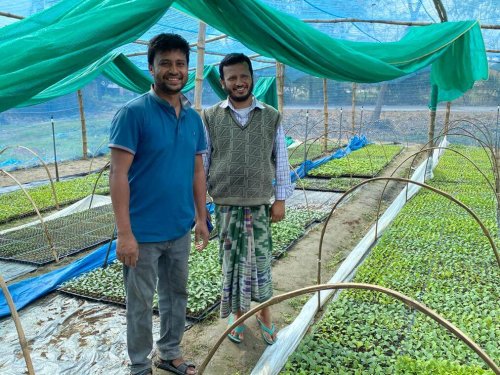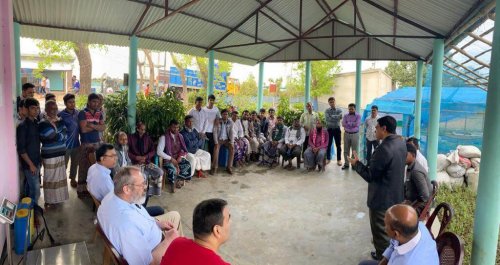Better Together: Partnering for the IWET Project in Bangladesh

The Introducing Water-Efficient Technologies in Barind Tract (IWET) project was developed in 2018 as part of the 2030 WRG Bangladesh Multi-Stakeholder Partnership (MSP)’s workstream on agricultural water. A partnership between the 2030 WRG Bangladesh MSP, the Coca-Cola Foundation, the Bangladesh Water Partnership (BWP), the Syngenta Foundation for Sustainable Agriculture (SFSA), and the Dascoh Foundation, the IWET project sets out to enhance agro-water productivity, reduce groundwater extraction, and increase farmers’ income while focusing on the water-stressed North-West region and especially the Barind Tract.
The project invests on (i) the use of drip irrigation technology on a mango plantation and (ii) rice cultivation using alternate wetting and drying technology. Partners are able to contribute using their respective capabilities: BWP promotes coordinated development and national policies for integrated water resources management. Dascoh Foundation supports farmer training and on-field demo plot management for the new technologies in collaboration with the farmers. SFSA supports resource-poor small farmers through innovation in sustainable agriculture and the activation of value chains. SFSA does this by supplying, testing, and introducing suitable water-efficient techniques for the mango and rice fields, and engaging with national and international water and agronomy experts. The goal is to try to increase farmers’ efficiency (“more crop per drop”) as well as water productivity (“value per drop”).

As for the Coca-Cola Foundation’s support of the project, it is a testament to the benefits that corporates can offer and gain in the 2030 WRG. Corporate partners, in addition to financially supporting the partnership, have active roles that extend from in-country engagement on water security to helping guide the 2030 WRG’s strategic direction, including participation in the 2030 WRG Governing Council (The Coca-Cola Company is a member). Corporates’ interest in the 2030 WRG is directly linked to the viability of their respective value chains, specific to water sustainability. For these companies, water is a key ingredient; as a result, they need to assure it is effectively managed, consumed, and accessed by all. As 2030 WRG partners, corporates can not only learn, but also contribute their expertise on cutting-edge developments that can help them consume less water, innovate their products, and help water-stressed populations gain access to water.
In two years, the IWET project has already been able to reach out to 6,000 mango and rice farmers and save 3,604,469 m3 of water. The project will continue for at least five to ten years as long-term implementation is necessary to counter the lack of groundwater for irrigation due to long-term excessive groundwater abstraction.

This March 2020, the project held a successful field trip that included a training session and the opportunity to meet with farmers, hub managers, and master franchisees. Special attention was paid to the project’s water-saving and backward/forward linkages, especially the locally-fabricated drip system that can be used for the next stage of large-scale investment. Explanations were provided on the plans for a complimentary agro-processing zone.
Photo credits: Jennifer Gulland, 2030 WRG
